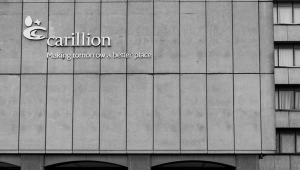Issuing the final report of the joint inquiry into Carillion, the business and work and pensions committees were highly critical of government business policy, the company’s directors, regulators and the accountancy and audit professions.
Work and pensions committee chair Frank Field said Carillion’s collapse was “a disgraceful example of how much of our capitalism is allowed to operate, waved through by a cosy club of auditors, conflicted at every turn”.
He added: “Government urgently needs to come to Parliament with radical reforms to our creaking system of corporate accountability.”
The government was also urged to immediately review the Crown Representative system. Crown Representatives provide an interface and single point of focus between the government and key suppliers but the report slammed them as “semi-professional and part-time”, and failing to provide sufficient warning of risks in a key strategic supplier.
But the report’s harshest words were reserved for the directors of Carillion who were labelled as greedy and complacent. Executive bonuses were paid out every year, even as the company began to unravel.
The MPs also highlighted the “aggressive accounting policies” followed by directors. In the case of Carillion’s loss-making contract with the Royal Liverpool Hospital, financial realities were disregarded by management and it was reported in accounts as making a profit. The company also accounted for revenue for work not yet agreed in order to maintain the appearance of healthy revenue flows, the committees said.
BEIS committee chair Rachel Reeves said Carillion’s “delusional” directors effectively drove the company off a cliff, but she added that Carillion’s auditors should also shoulder a portion of the blame.
“They are guilty of failing to tackle the crisis at Carillion, failing to insist the company paint a true picture of its crippling financial problems,” she said.
“The sorry saga of Carillion is further evidence that the Big Four accountancy firms are prioritising their own profits ahead of good governance at the companies they are supposed to be putting under the microscope.”
The report called on the government to refer the statutory audit market to the Competition and Markets Authority, which should be encouraged to consider breaking up the audit arms of the Big Four firms or splitting their audit functions from their non-audit functions.
Lack of competition in the audit market created “conflicts of interest at every turn”, the MPs said.
“KPMG were external auditors, Deloitte were internal auditors and EY were tasked with turning the company around.
“PwC variously advised the company, its pension schemes and the government on Carillion contracts.”
As the least conflicted of the Big Four, PwC was appointed special manager in the insolvency process and so could “name its price”.
There was also some strong criticism of regulators, specifically the Financial Reporting Council and The Pensions Regulator.
These were “united in their feebleness and timidity” and too “passive and reactive” to make effective use of their powers. Both need a change of culture and outlook, the MPs said.
The CBI buisiness group, however, said it was “irresponsible and reckless” to characterise business as greedy and reckless, as the report did.
Deputy director general Josh Hardie said: “Carillion was a painful lesson for business and government on the dangers of short-termism in public service contracts. This failure should act as a catalyst for a level-headed discussion about how the public and private sectors work together to deliver value to society, as they so often do.”
He warned that “knee-jerk soundbites” risked locking out innovation and investment from the public sector.











